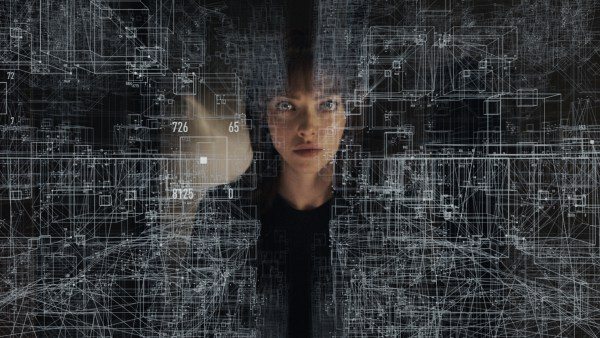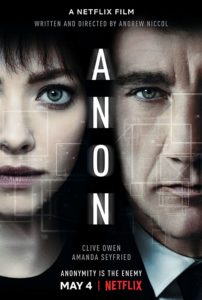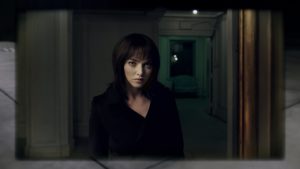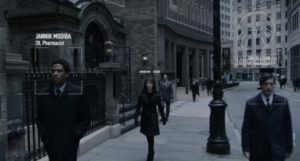
ANON
 Starring: Clive Owen, Amanda Seyfried, Colm Feore, Joe Pingue, Mark O’Brien
Starring: Clive Owen, Amanda Seyfried, Colm Feore, Joe Pingue, Mark O’Brien
Director: Andrew Niccol
Writer: Andrew Niccol
Reviewed by Sidney Morgan
This review CONTAINS SOME SPOILERS.
How much do you value your privacy? Would you trade it away for the guarantee of a safe, crime-free society? Would you trust the government to be the safeguard of your private life? Writer and director Andrew Niccol’s new movie, Anon, takes place in just this kind of society. Starring Clive Owen as detective Sal Friedland, it’s a story in which Sal is tasked with solving a particularly difficult murder case. Whereas in every crime he’s investigated thus far there’s been a file, or record, identifying the culprit, these murders have none. The perpetrator is able to remotely access the files and remove all digital traces that would lead to identification.
In Anon‘s future, every person has an augmented reality device implanted in their eye or eyes (it’s never made clear) at birth which accomplishes two things. First, as you look around, information is uploaded in real time about the things and people you see. For example, if you’re looking at food, it brings up nutritional information. If you see someone, it identifies them. It can also upload ads if you spend time looking at specific items. Convenient as well, if you speak to someone in a foreign language, it translates and provides the subtitles in real time.
Second, but far more intrusive, is that everything you do and subsequently witness with your own eyes, is recorded and uploaded in a server called the ether. And people with the rights to access the ether can access your files and see what you saw. So there’s no crime. If you watch yourself robbing a bank, there would be a file of what you saw. And you are fully aware of this. Though there are great applications with this kind of technology, it also means that there is no more anonymity. Unless…

The prime suspect, a femme fatale looking Amanda Seyfried, (simply referred to as ‘the girl’) has a special set of hacking abilities whereby she can modify someone’s records and make unwanted recordings disappear. And from our perspective, it looks easy. No computer screen. No keyboard or mouse. Just her eyes and power of the mind are needed. But she doesn’t come cheap, and her clientele includes higher ranking citizens. However, the people she helps are turning up dead. The traditional way of solving crimes won’t work as there’s no file. Given her skills, the police believe she’s modified her own records so that victims don’t record her as she shoots them. And with Sal, a potential victim as he made use of the girl’s services, a game of cat and mouse ensues between the two.
Police work in this future is bizarre and borders an odd type of voyeurism. Traditionally, investigations required watching suspects, going from place to place to seek out clues, and even having stake-outs. But in Anon, all one has to do is to access the records or even get a live link to the suspect’s eyes, which can be accomplished from the police station. Consequently, investigators see what culprits see and what they’ve done. And I mean everything they’ve done. It’s a great tool for law enforcement, but for us viewers, it ends up looking like the officers doing the watching are hypnotized or something, sitting still and barely blinking. There’s no banana in the tailpipe scene like in Beverly Hills Cop. It isn’t that exciting to watch.

The movie has a few plot holes. For starters, they’ve identified this woman as a potential suspect, knowing what she has done. But she’s never taken into custody, even when Sal is physically with her. She’s a hacker, not a fighter and Sal could easily restrain her. They keep letting her leave, knowing that’s she’s capable of ‘disappearing.’ On the subject of hacking, it’s revealed that there are other, equally and less effective hackers. But to modify files, they all have to access the ether (the repository for all the records). So if that’s possible, why isn’t anyone stealing records and blackmailing people? Technology may have changed, but human nature hasn’t, and the movie has plenty of examples of that. And finally, if looking away from one’s hands, or even closing one’s eyes is enough to throw off the veracity of the record, why isn’t it done more often?
Movies, especially science-fiction and fantasy ones, require the suspension of disbelief in order to accept new realities. For example, I didn’t worry and question the existence of dragons as I watched Smaug hiding in the Lonely Mountain, but rather focused on his story. Nor did I think about the physics of light, plasma and energy and how they make the existence of lightsabers practically impossible. I just enjoyed the training and the duels because it looked awesome on screen.
But as I watched Anon, I kept wondering why we’d ever let the government have that kind of access to our lives? These agencies can see everything. Your daily activities, passwords, and even intimate encounters. If your eyes are open, it’s recorded and accessible. If the Facebook / Cambridge Data issue is any indication, privacy is something people hold dear and are willing to fight for. But that’s partly the trouble with Anon. It passes off frightening technology as something fun, and no worse than the equivalent of Google glasses.
Anon is like a buffet. There’s a murder mystery. There’s a bit of drama as Sal deals with the death of his son, his divorce and a drinking problem. A bit of a political thriller as the hacker threatens to bring down the status quo. There’s a bit of film noir where the only thing missing is a smoking Amanda Seyfried. And sprinkled throughout all of that is an attempt to make a social comment about the dangers of this type of invasive tracking. The combination is fun.
The sets of the city, buildings, cars, offices were all normal, giving the impression that this wasn’t some far off future. The only real difference between our present and the movie’s future is the biotech implant which gives us that first-person view. It was distracting at first, seeing all that information pop up on the screen, but you quickly grow accustomed to it. For those who’ve played a first-person shooter before, this will look very familiar. And the actors performed well given the story. To be fair, there’s only so much you can do when the direction calls for staring directly ahead at nothing in particular.

There’s one aspect of this technology that is only briefly touched upon. As the girl shows us, it is possible to hijack someone’s implant and subsequently make them see things that aren’t there, like a fire, a ledge, animals or even an attacker. It’s realistic and makes discerning the superimposed scene from reality very difficult. Good things could come of this, such as the ability of taking virtual vacations. Imagine being able to ‘walk through’ a new house or finished renovations even before the first nail was planted? However, in the wrong hands, this could lead to terrifying results.
The concept of Anon is both intriguing and frightening. With privacy issues so predominant today, it’s understandable to wonder where this will head. Andrew Niccol offers one opinion and might just be warning us. It’s an Orwellian world, one in which the government essentially controls you. There’s essentially nothing that can be hidden unless you use an expensive hacker. When governments and corporations have this kind of access, and ultimately power, it’s not always beneficial for citizens. But also critical to understanding the issue is the justification for such intrusive observation. Governments may claim that if you have nothing to hide, then there shouldn’t be any reason to worry, but in the words of the girl, “It’s not that I have something to hide, I have nothing I want you to see.” And that’s something we should fight for.
Verdict
Anon is a good movie. In a time where so many thrillers are packed with action, it’s nice to see one that simmers. And followers of Niccol’s works (Gattaca, The Truman Show) shouldn’t be surprised by this end product. But don’t be fooled. Under that simmering surface is enough pressure to make it all come to a roiling boil. And ultimately, that’s the moral of this story. So, give it a watch. There’s enough there for an enjoyable viewing.
Anon is now streaming on Netflix.



![[REVIEW] SAVAGE AVENGERS #1](https://geekd-out.com/wp-content/uploads/2019/04/9C4134F1-5168-4A5F-A2A4-ED695CF2A9A2-e1556677443525-150x150.jpeg)